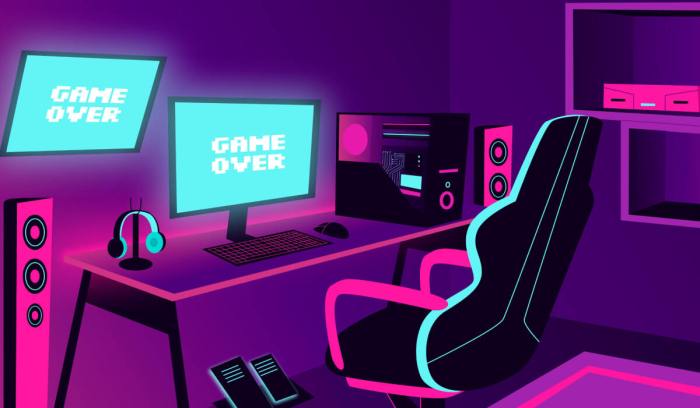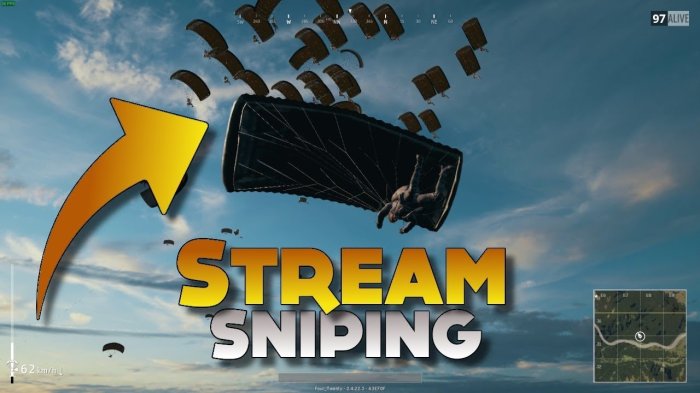What is stream sniping? It’s a practice in the online gaming world where individuals exploit live streams of other players to gain an unfair advantage. This engaging introduction delves into the captivating realm of stream sniping, providing an intriguing overview of its methods, impact, and ethical implications.
In the realm of competitive gaming, stream sniping has emerged as a controversial practice, sparking debates about fairness and ethics. This comprehensive guide explores the intricacies of stream sniping, examining its techniques, consequences, and potential legal implications.
What is Stream Sniping

Stream sniping is an unethical practice in online gaming where viewers exploit a streamer’s live broadcast to gain an unfair advantage over them.
Stream snipers achieve this by watching the streamer’s gameplay and using the information they obtain to predict their next moves, ambush them, or gain other strategic benefits.
Methods of Stream Sniping
- Discord and Chat Overlays:Stream snipers join the streamer’s Discord or chat and use the information shared there to track their movements.
- Stream Delay:Stream snipers take advantage of the delay between the streamer’s gameplay and the broadcast to predict their actions.
- Website and Extensions:Third-party websites and browser extensions allow stream snipers to monitor the streamer’s location and other game data in real-time.
Impact of Stream Sniping, What is stream sniping

Stream sniping has severe consequences for streamers and the gaming community:
- Frustration and Anxiety:Streamers experience frustration and anxiety as they constantly fear being targeted by stream snipers.
- Diminished Viewer Experience:Stream sniping ruins the entertainment value for viewers, as it creates an unfair and predictable gaming experience.
- Reputation Damage:Streamers may lose viewers and followers due to the negative impact of stream sniping on their content.
Countermeasures against Stream Sniping
Streamers can implement various strategies to prevent stream sniping:
- Delaying Stream:Increasing the stream delay makes it harder for stream snipers to exploit real-time information.
- Using Anti-Sniping Software:Software can detect and block stream snipers by analyzing chat messages and other data.
- Hiding Sensitive Information:Streamers can blur their minimap, hide their username, and disable chat overlays to reduce the amount of information available to stream snipers.
Streaming platforms also play a role in combating stream sniping:
- Banning Stream Snipers:Platforms can ban users who are caught stream sniping.
- Implementing Anti-Sniping Features:Some platforms offer built-in features to help streamers prevent stream sniping.
Ethical Considerations

Stream sniping raises ethical concerns:
- Fair Play:Stream sniping undermines the principles of fair play and competition in online gaming.
- Privacy Invasion:Stream snipers often obtain personal information about streamers, which can be used for harassment or other malicious purposes.
Legal Implications

Stream sniping may have legal implications:
- Copyright Infringement:Stream sniping can violate copyright laws if the streamer’s content is protected.
- Harassment:Stream sniping can be considered harassment if it causes emotional distress or interferes with the streamer’s ability to enjoy the game.
Common Queries: What Is Stream Sniping
What is the definition of stream sniping?
Stream sniping is the practice of using a live stream of a player’s gameplay to gain an unfair advantage in an online game.
How is stream sniping achieved?
Stream snipers typically use software or tools to monitor the live stream and track the player’s location and movements in the game.
What are the negative consequences of stream sniping?
Stream sniping can ruin the gaming experience for streamers, making it difficult for them to enjoy the game and interact with their viewers.
What are some strategies streamers can use to prevent stream sniping?
Streamers can use various strategies to prevent stream sniping, such as delaying their live stream, using anti-sniping software, and limiting who can view their stream.
